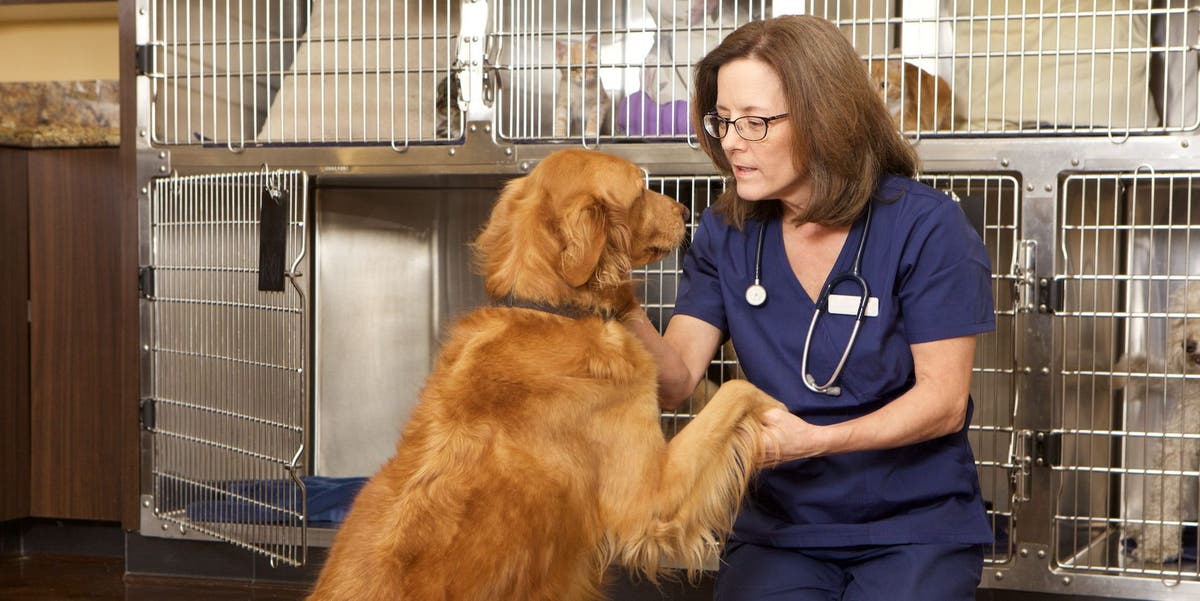Understanding the importance of veterinary behaviour in improving pet well-being
Wiki Article
Recognizing the Role of a Veterinary Behaviourist in Animal Training and Well-being
The duty of a vet behaviourist is necessary in resolving the detailed relationship in between animals and their proprietors. They incorporate vet medicine with understandings from animal behavior scientific research to deal with issues like aggressiveness and anxiousness. Unlike conventional instructors, their technique focuses on the underlying reasons of these habits. This nuanced viewpoint questions about the performance of traditional training methods and exactly how a deeper understanding can transform pet health. What methods do they employ to accomplish these outcomes?What Is a Veterinary Behaviourist?
A vet behaviourist is a specialized specialist who concentrates on understanding and dealing with the behavior issues of animals, specifically animals. Their knowledge incorporates veterinary medicine and pet behavior science, allowing them to diagnose and treat a variety of behavioral troubles - veterinary behaviour. These experts often hold sophisticated levels, such as a Master's or PhD in animal habits, and are accredited by relevant organizations, ensuring they have a deep understanding of pet psychologyVeterinary behaviourists examine pets via comprehensive observation and evaluation, taking into consideration factors such as genetics, atmosphere, and training history. They create customized therapy strategies, which might consist of desensitization techniques, favorable support techniques, and ecological changes. Partnership with pet dog proprietors is vital, as they supply advice and assistance throughout the training procedure. Inevitably, the objective of a vet behaviourist is to boost the health of the pet while cultivating an unified partnership in between family pets and their proprietors.
The Value of Recognizing Pet Habits
Comprehending animal behavior is important for both pet owners and specialists in the area of pet care, as it lays the foundation for effective interaction and training. Identifying just how pets view their atmosphere and respond to stimuli makes it possible for caregivers to produce a more unified living scenario. Insight into behavior hints, such as body language and vocalizations, cultivates more powerful bonds between pets and their proprietors. By appreciating the natural reactions and requirements of different species, people can tailor their training approaches to accommodate these variables, advertising better learning and cooperation. In addition, a strong grasp of behavior science help in determining stressors and possible triggers, enabling positive treatments. On the whole, recognizing animal behavior not just enhances the health of family pets yet also enhances the experiences of those who take care of them, ultimately bring about healthier, better partnerships.Typical Behavioral Issues Resolved by Veterinary Behaviourists
Vet behaviourists frequently attend to common behavior concerns in animals, consisting of aggression and concern responses. They likewise concentrate on anxiety and anxiety monitoring, which can considerably influence an animal's wellness. Recognizing these issues is necessary for developing effective training and treatment approaches.Aggression and Worry Feedbacks
While many animal proprietors might view hostility and concern feedbacks as easy behavioral problems, these intricate responses frequently come from underlying stress and anxiety or previous trauma. Veterinary behaviourists play a vital duty in recognizing the root causes of these behaviors, which can manifest in different types, including growling, attacking, or too much anxiety of certain circumstances. Comprehending these triggers is crucial for creating effective training strategies tailored to every animal's unique scenarios. Behaviourists use techniques such as desensitization and counter-conditioning to help pet dogs handle their concerns and hostility. Furthermore, they educate animal proprietors concerning ideal monitoring strategies, highlighting the value of persistence and consistency. Dealing with aggression and fear feedbacks not just enhances the animal's quality of life but additionally enhances the bond between pet and proprietor.Anxiousness and Stress Monitoring
Anxiousness and stress prevail concerns that lots of animals face, often arising from modifications in their environment, absence of socialization, or previous negative experiences. Vet behaviourists play an essential role in recognizing the underlying sources of these concerns. They utilize various strategies, including behavior modification, desensitization, and counter-conditioning, to aid family pets manage anxiousness. In addition, they might recommend ecological changes, such as developing risk-free rooms or offering enrichment tasks that promote leisure. Collaboration with pet dog owners is essential, as behaviourists assist them in understanding their family pet's signals and executing reliable coping techniques. By resolving stress and anxiety and stress and anxiety, veterinary behaviourists add greatly to enhancing the total wellness and top quality of life for pet dogs and their families.How Vet Behaviourists Vary From Conventional Instructors
Veterinary behaviourists differ from traditional trainers mainly in their educational backgrounds and training. While standard trainers usually focus on obedience and fundamental commands, vet behaviourists stress understanding and dealing with underlying behavioral concerns, including clinical considerations into their method. This unique emphasis enables them to supply an extra comprehensive treatment for family pets with complicated behavior obstacles.Education And Learning and Training Distinctions
Understanding the distinction between veterinary behaviourists and conventional fitness instructors is crucial for animal proprietors looking for efficient training remedies. Veterinary behaviourists have postgraduate degrees in veterinary medicine, usually complied with by specialized training in animal practices. This education and learning equips them to address complicated behavioral problems that may originate from clinical conditions or mental aspects. On the other hand, typical instructors commonly have accreditations from training programs that concentrate on obedience and basic commands without delving right into the underlying psychological or clinical elements. While both experts aim to improve pet behaviour, vet behaviourists can detect and treat behavioral troubles holistically, integrating clinical understanding right into training methods. This vital distinction highlights the significance of selecting the ideal expert based on the pet dog's certain needs.Concentrate On Behavioral Issues
Resolving behavioural concerns needs a nuanced approach that identifies veterinary behaviourists from typical fitness instructors. While conventional instructors commonly concentrate on obedience and standard commands, veterinary behaviourists check out deeper right into the underlying root causes of bothersome behaviours. They use a comprehensive understanding of pet psychology and therapy get redirected here methods, which are rooted in clinical research. This proficiency allows them to identify problems originating from stress and anxiety, anxiety, or aggression, instead of merely attending to surface-level symptoms. Furthermore, veterinary behaviourists analyze the animal's total wellness, taking into consideration environmental variables and the animal's background. By integrating clinical expertise with behavioural approaches, they supply customized services that advertise lasting behavioural modification, making certain both the animal's and proprietor's lifestyle are markedly enhanced.Clinical Considerations Consisted Of
While standard fitness instructors might overlook hidden medical concerns, vet behaviourists focus on a complete analysis of a family pet's health as a foundational step in dealing with behavioural troubles. This technique permits them to identify prospective medical conditions that may contribute to unfavorable behaviors, such as stress and anxiety, pain, or neurological conditions. By integrating medical evaluations into their practice, vet behaviourists can team up with vets to assure an alternative understanding of the family pet's wellness. Furthermore, they can recommend appropriate therapies or changes to training strategies based on medical searchings for. This considerable perspective identifies vet behaviourists from typical instructors, as they resolve both behavioral and health-related variables, inevitably bring about a lot more efficient and sustainable outcomes for pet dogs and their proprietors.
The Process of Working With a Vet Behaviourist
Working together with a vet behaviourist includes a systematic approach to resolving a family pet's behavioral concerns. The process begins with a comprehensive evaluation, where the behaviourist collects thorough info about the pet's background, atmosphere, and details behaviors that are bothersome. This usually consists of sets of questions, meetings with the pet owner, and in some cases monitorings of the pet dog in its environment.Complying with the evaluation, the vet behaviourist creates a customized intervention strategy that might consist of behavioral modification techniques, training techniques, and, if needed, suggestions for clinical analyses. veterinary behaviour. The plan is designed to be practical and achievable, making certain that it fits seamlessly right into the pet dog proprietor's way of living
Subsequent follow-up sessions are important to keep an eye on progress, adjust approaches, and give support. This collaborative initiative not just intends to customize unwanted behaviors but also to enhance the overall well-being of the pet dog, ensuring an unified partnership in between the animal and its proprietor.
Enhancing Your Family pet's High quality of Life With Behavioral Support
Enhancing a pet dog's lifestyle through behavioral assistance is crucial for promoting a healthy and fulfilling relationship in between pet dogs and their proprietors (dog behaviourist near me). Veterinary behaviourists play an important role in identifying and resolving behavior problems that may impede a pet dog's well-being. With customized methods, they assist alleviate anxiety, fear, and aggression, inevitably advertising a more balanced and satisfied petBehavior assistance includes different strategies, including positive support, environmental enrichment, and socializing. By executing these methods, owners can develop a caring setting that encourages positive habits. This not only improves the pet dog's psychological health but likewise enhances the bond in between pet dog and proprietor.
Additionally, routine examinations with a vet behaviourist warranty that any kind of emerging behavioral issues are immediately resolved, preventing escalation. In general, purchasing behavior assistance is a proactive method that considerably improves a pet's life, leading to improved physical and mental health outcomes.
Frequently Asked Concerns
What Credentials Do Vet Behaviourists Possess?
Veterinary behaviourists normally hold a veterinary level, complied with by specialized training in pet habits. Lots of additionally have qualifications from identified companies, demonstrating their experience in addressing pet actions problems and advertising general animal well-being.Can Veterinary Behaviourists Prescribe Drug for Pets?


Vet behaviourists, possessing vet degrees and specialized training, can indeed suggest medication for pets. This ability permits them to deal with underlying behavior issues successfully, frequently incorporating pharmacological therapy with behavior adjustment approaches for best outcomes.
For How Long Does Behavior Modification Usually Take?
Behavior treatment period varies substantially, generally ranging from a couple of weeks to numerous months. Elements influencing this timeline include the pet dog's specific problems, uniformity of training, and the proprietor's engagement while doing try these out so.Are Remote Examinations Offered With Veterinary Behaviourists?

Just how Much Does a Veterinary Behaviourist Consultation Price?
The expense of a veterinary behaviourist examination usually ranges from $100 to $300, relying on elements such as area, experience, and session length. Additional charges may use for follow-up assessments or specialized solutions.Report this wiki page